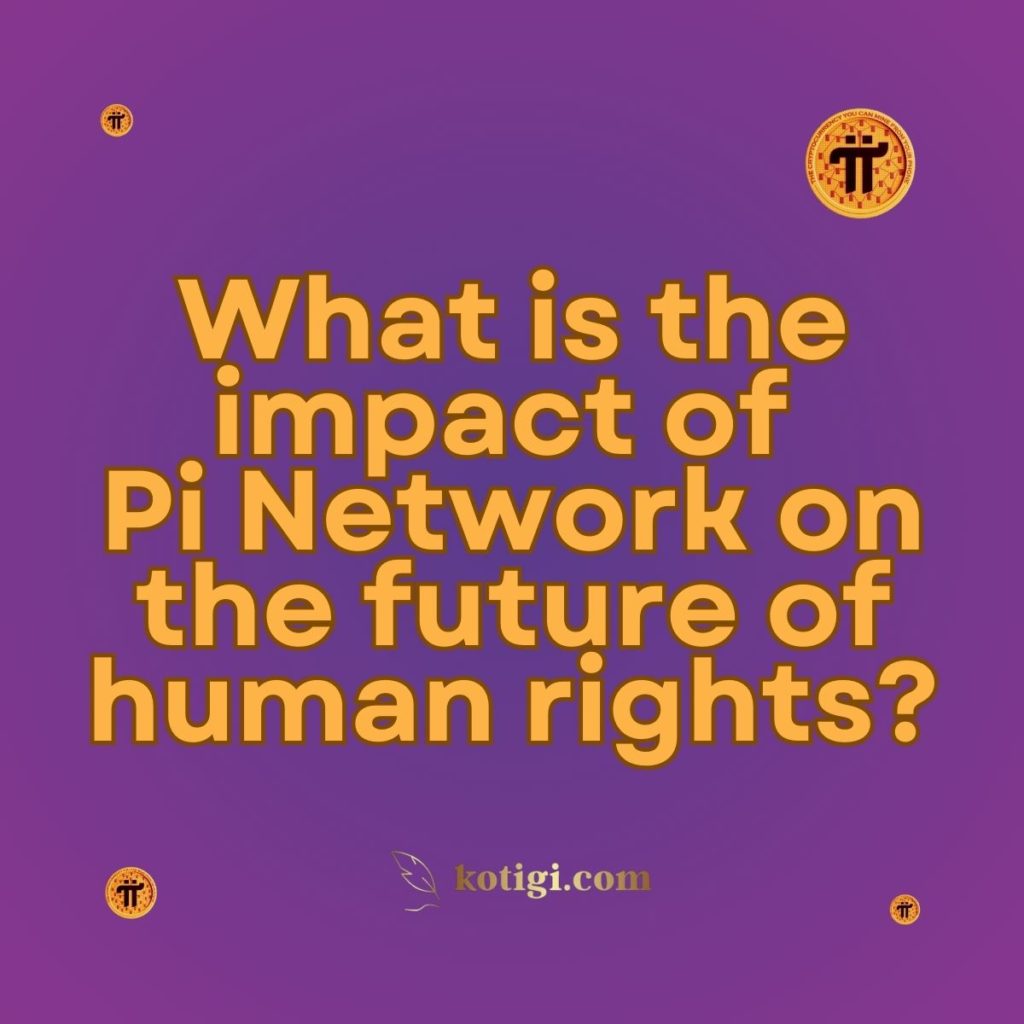
What is the impact of Pi Network on the future of human rights?
The Pi Network has the potential to significantly impact human rights by promoting inclusivity, enhancing freedom of expression, securing personal data, and facilitating economic empowerment. This article explores how the Pi Network could contribute to advancing human rights in the digital age.
Introduction
Human rights are fundamental principles that guarantee the dignity, freedom, and equality of all individuals. However, in today’s digital age, the intersection of technology and human rights is increasingly significant. The rise of blockchain technology, exemplified by initiatives like the Pi Network, offers innovative solutions to longstanding human rights issues. By fostering inclusivity, enhancing freedom of expression, protecting personal data, and empowering individuals economically, the Pi Network has the potential to create a more equitable and just society. This article explores the various ways in which the Pi Network could impact human rights in the future.
Promoting Inclusivity and Accessibility
The Pi Network aims to create an inclusive and accessible platform for all users, particularly those who have been historically marginalized or excluded from the financial system. This commitment to inclusivity is crucial in advancing human rights.
Bridging the Digital Divide
Many individuals around the world lack access to traditional banking services and financial systems. Pi Network addresses this issue by allowing users to mine and use Pi coins through their mobile phones, making it accessible to anyone with a smartphone. By bridging the digital divide, Pi Network empowers individuals in developing regions to participate in the global economy, enhancing their economic rights.
Empowering Marginalized Communities
By providing an easy entry point into the digital currency space, Pi Network empowers marginalized communities that have been historically excluded from financial systems. This includes women, refugees, and low-income individuals who often face barriers to accessing banking services. By facilitating economic inclusion, Pi Network contributes to the realization of social and economic rights for these communities.
Fostering Global Community
The Pi Network promotes a sense of global community by connecting users from diverse backgrounds. This interconnectedness enables individuals to share experiences, advocate for their rights, and support one another in their pursuits of economic opportunities. By fostering a supportive and inclusive environment, Pi Network contributes to the recognition and protection of human rights globally.
Enhancing Freedom of Expression
The Pi Network’s decentralized nature can bolster freedom of expression by providing users with a platform to share their thoughts, ideas, and opinions without fear of censorship or repression.
Decentralized Communication Channels
In many regions, governments censor online communication and restrict freedom of speech. Pi Network allows users to create decentralized applications (dApps) that facilitate secure and uncensored communication. This empowers individuals to express themselves freely, share information, and mobilize for social change, thereby advancing the right to freedom of expression.
Protecting Anonymity and Privacy
Pi Network’s emphasis on user privacy can enhance individuals’ rights to express themselves without fear of surveillance. The blockchain’s encrypted transactions and secure user identities allow individuals to engage in discussions and share their views without risking exposure or retaliation. This protection of anonymity is especially vital in authoritarian regimes where dissent can lead to persecution.
Encouraging Civic Engagement
By providing tools for secure communication and organizing, Pi Network can encourage civic engagement and political participation. Users can form communities, advocate for human rights, and mobilize for social justice issues, thereby enhancing their ability to influence political discourse and promote democratic values.
Securing Personal Data and Digital Rights
In an era of increasing data exploitation and privacy violations, the Pi Network offers users greater control over their personal information, thereby enhancing their digital rights.
Ownership of Personal Data
With Pi Network, users have ownership of their personal data through the use of blockchain technology. This empowers individuals to control how their data is shared and used, reducing the risks associated with data breaches and exploitation by third parties. By ensuring data ownership, Pi Network supports the right to privacy and protects individuals from unauthorized access to their information.
Transparency and Accountability
The transparent nature of blockchain technology allows users to track how their data is being used and who has access to it. This accountability fosters trust in digital systems and encourages responsible data practices. By promoting transparency, Pi Network helps uphold the right to information and ensures that users can make informed decisions about their digital interactions.
Reducing Exploitation of Vulnerable Populations
Pi Network’s secure platform can protect vulnerable populations from data exploitation and abuse. For instance, marginalized communities often face heightened risks of exploitation by unscrupulous organizations. By providing a secure and transparent environment for data management, Pi Network can help protect these individuals and uphold their rights.
Facilitating Economic Empowerment
Economic rights are fundamental to human dignity, and the Pi Network can empower individuals economically through its innovative digital currency system.
Access to Financial Services
Pi Network enables individuals to mine and use Pi coins through their mobile devices, providing access to financial services for those who lack traditional banking options. This democratization of financial resources empowers users to participate in the economy, secure loans, and engage in trade, enhancing their economic rights.
Enabling Entrepreneurship
The Pi Network’s ecosystem allows users to create decentralized applications and businesses, fostering entrepreneurship. This encourages individuals to innovate, create jobs, and contribute to their communities’ economic development. By promoting entrepreneurship, Pi Network helps individuals exercise their economic rights and pursue their aspirations.
Supporting Local Economies
As Pi Network grows, it has the potential to stimulate local economies by enabling peer-to-peer transactions and supporting local businesses. This economic empowerment can lead to improved livelihoods and greater self-sufficiency, contributing to the realization of economic rights for individuals and communities.
Advocating for Social Justice and Human Rights
The Pi Network can serve as a platform for advocacy, enabling users to mobilize for social justice and human rights issues.
Facilitating Activism and Advocacy
Pi Network provides tools for individuals to organize, collaborate, and advocate for social change. Users can form networks to support various human rights causes, raising awareness and mobilizing resources for their initiatives. This capability strengthens collective action and promotes social justice efforts.
Supporting Human Rights Defenders
The Pi Network’s secure and decentralized environment can protect human rights defenders from retaliation and persecution. Activists can use the platform to communicate, share information, and organize campaigns without fear of surveillance or government crackdowns. This support for human rights defenders is vital in safeguarding their work and advancing human rights.
Building Awareness and Education
Pi Network can serve as a platform for educating users about human rights issues and fostering awareness of global injustices. Through decentralized applications and community engagement, users can share knowledge, advocate for change, and support initiatives that promote human rights. This emphasis on education contributes to a more informed and active citizenry.
Conclusion
The Pi Network holds significant potential to impact human rights by promoting inclusivity, enhancing freedom of expression, securing personal data, and facilitating economic empowerment. By providing a decentralized platform that empowers individuals and communities, Pi Network can contribute to a more just and equitable society. As technology continues to evolve, it is crucial to harness its potential to uphold and advance human rights, ensuring that all individuals have the opportunity to thrive in a digital world.
Key Takeaways
- Promoting Inclusivity: Pi Network bridges the digital divide by providing accessible financial services to marginalized communities, enhancing their economic rights.
- Enhancing Freedom of Expression: Decentralized communication channels on Pi Network protect users’ freedom of speech and enable secure civic engagement.
- Securing Personal Data: Pi Network empowers users to own their data, promoting privacy rights and protecting against exploitation.
- Facilitating Economic Empowerment: By enabling access to financial services and supporting entrepreneurship, Pi Network enhances economic rights for individuals.
- Advocating for Social Justice: Pi Network provides a platform for advocacy, empowering users to mobilize for human rights and social justice initiatives.





